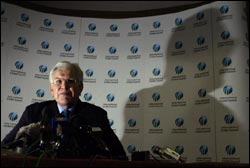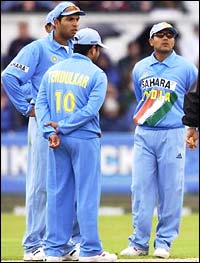Home > Cricket > World Cup 2003 > Interview >
The Rediff Interview /
Signing contracts a positive development, says Justice Ebrahim
January 15, 2003
Former Zimbabwe Chief Justice A M Ebrahim was in Delhi for the three-day Pravasi Bharatiya Divas. Little did he expect someone from the media to ask him about his role as intermediary between the Board of Control for Cricket in India and the International Cricket Council on the ticklish 'contracts issue' for next month's World Cup.
"How did you know I am here?" he asked, when rediff.com approached him for an interview on cricket at Pragati Maidan.
He said given his legal background it was natural that someone who could interpret the law had to be included on the ICC Contracts Committee, but denied acting as a go-between the BCCI and ICC.
Is it true you have been asked to mediate between the BCCI and ICC on the contracts issue?
 Let me correct the impression that I have been appointed as a go-between the ICC and BCCI. What happened was as the dispute evolved the ICC decided it would appoint a World Cup Contracts Committee, which comprised Malcolm Gray, chairman of the ICC; Malcolm Speed, chief executive; two members of the affiliated boards from Australia and India, and one more person. As I had a legal background they felt they needed to have a sixth member who would have an independent view-point. This perhaps influenced their decision and I was inducted as the sixth member of the committee. So it is not accurate to say I was appointed as a mediator or go-between. I was very much a part of the Contracts Committee.
Let me correct the impression that I have been appointed as a go-between the ICC and BCCI. What happened was as the dispute evolved the ICC decided it would appoint a World Cup Contracts Committee, which comprised Malcolm Gray, chairman of the ICC; Malcolm Speed, chief executive; two members of the affiliated boards from Australia and India, and one more person. As I had a legal background they felt they needed to have a sixth member who would have an independent view-point. This perhaps influenced their decision and I was inducted as the sixth member of the committee. So it is not accurate to say I was appointed as a mediator or go-between. I was very much a part of the Contracts Committee.
Both the ICC and BCCI are threatening to move the Court of Arbitration for Sports to seek redress.
I don't think either of them is trying to go to the International Court of Justice; they are trying to resolve their dispute within the framework of the agreements that have been evolved during the course of negotiations before the Contracts Committee was appointed. Before the Contracts Committee was appointed there was an opportunity for an aggrieved party to go to the Alternative Disputes Resolution Committee, which would be part of the ICC set-up. Part of the suggestion was we should go in for arbitration to an arbitration body which has its headquarters in Switzerland. But this is still within the process of negotiation. That is where things stand at the moment.
Though the Indian players have signed the controversial contracts, they have added their own conditions to them. How do you look at this?
I am a little out of touch with developments in the cricket world because I have been traveling. Of course, I have read in the Indian newspapers that the Indian players have signed the contracts. I would put it they signed the contracts under the cloak of protest against the clauses they do not feel happy with or are upset about.
I would say this is a positive development and it indicates the willingness of all 15 selected players to take part in the World Cup. India and the public in this country want them to play; the World Cup organisers and the ICC are anxious that they play.
I am delighted that at long last some progress has been made on this front, but there are some other areas that still have to be resolved.
 So the ICC did expect some dispute to arise?
So the ICC did expect some dispute to arise?
No. I would not leave this comment untouched. In any contractual process the legal advice would be given to you that there should always be some fall back situation in case something went wrong somewhere between the signing parties.
The Indian players and BCCI think they have been given an unfair contract to sign.
I come from a legal background. As a judge, I would say that as the matter remains sub-judice it would not be proper for me to make a comment. I wish I could be more forthcoming but commonsense says it would be ill-advised for me to do so.
Countries like England and Australia have expressed their unwillingness to play in Zimbabwe, co-hosts of the World Cup along with South Africa, on grounds of security...
I am glad you asked me this question because I feel very strongly about it. The ICC had an international delegation representing a wide range of countries visiting Zimbabwe to see for themselves the situation in our country. They studied the situation very carefully and minutely. They had discussions with the authorities right across the board and came to the conclusion that from the security point of view there is no problem. We must respect their findings.
I am of the opinion that all countries participating in the World Cup must stand by the committee appointed by the ICC for this purpose.
Are you saying Zimbabwe is a secure country to play World Cup matches?
Absolutely! There is no doubt about that. I think some of you should visit Zimbabwe and see for yourself that there is nothing wrong from the security point of view.
How important is the World Cup to Zimbabwe?
I knew this was coming. In the last two years we have vigorously put in place a development programme for cricket in our domestic circuit. Though this has been going on for 40 years the pace has picked up in the last two years. As a result of our efforts there is a whole stream of young players playing competitive cricket in Zimbabwe. These up-and-coming players are coming through the pipeline which is a good indication from the Zimbabwe cricket point of view. If this World Cup does not take place, I have a real fear it would harm the progress we have made in the last two years. It might just puncture the pipeline we have put in place with such great effort.
Therefore, I am very anxious that World Cup matches go on unhindered in Zimbabwe. It is more important because we have a number of talented players emerging from the black community, knocking for a place in the side. We have done very well ever since we have been given the status of a Test-playing nation. Our young and inexperienced players have done very well against India, both in Test matches as well as in one-day matches. We have to develop the game so that it takes root right through the system.
That is why we want all the World Cup matches in Zimbabwe played by all those countries who have been drawn to play there.
The Contracts row - the complete coverage
More Interviews
Schedule | Interviews | Columns | Discussion Groups | News | Venues